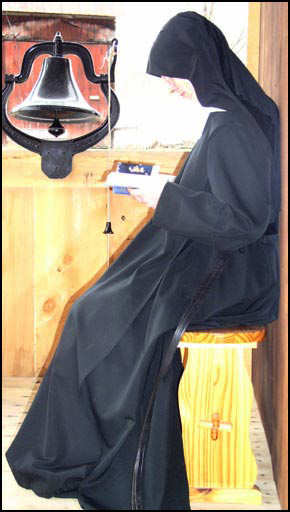|

Hospitals and Hermitages: Strange Bedfellows?
By Dennis Patrick Slattery, Ph.D.

Dennis Patrick Slattery, Ph.D. is Core Faculty, Mythological Studies, Pacifica Graduate Institute.
The author of over 225 articles on culture, psychology and literature, as well as author of 7 books,
his most recent is entitled Grace in the Desert: Awakening to the Gifts of Monastic Life
(Jossey-Bass, 2004), which describes a spiritual pilgrimage staying in 12 monasteries and Zen Buddhist
centers in the United States over a three and a half month sojourn. He was also a presenter at
Mythic Journeys 2004, and he will present a lecture and workshop on February 17 and 18,
2006, for the C.G. Jung Society of Atlanta, a partner of the Mythic Imagination Institute.
As I rest at home these days, recovering from emergency appendectomy surgery after a
pesky appendix recently chose to rupture at a most inconvenient time, I recalled lying in my hospital
room one night at 2 a.m. listening to the nurses chatting in the hall, and pondering how monastic my
experience was beginning to shift into. An existence full of medication was beginning to shift into a
still life of meditation.
I have spent many months in monasteries over the years, even publishing a book recently
describing my pilgrimage. But to connect my bodily aching now, stapled together with clamps that
made my abdominal wound a thin smile with funny teeth, with the spiritual life of hermitage life,
was a revelation.
Here's how.

Entering a monastery, one gives up or abdicates the normal round of one's life and surrenders
oneself to something beyond oneself. So it is with the life of a hospital patient, where one's will is
dwarfed to the will of surgeons, nurses, orderlies, food service, and to body functions that may or may
not be working. The more one abdicates control, the richer, even more complex, the experience becomes.
I can still hear the man in the next room barking at nurses, calling for aides to serve him as he shouts
from his bed. Clearly the patient and the penitent are at odds in his recovery.
In monastic life, one enters not just a different space, but a different time. Hospital time and monastic
time share a certain slowness, a ripening, where diversions are stripped away and one is thrown back on to
the mercy of surgeons, who I believe are supernatural creatures, or on to the mercy of God and His will.
"In His will is my peace" proclaims a repentant soul in Dante's Paradiso, saved by her willingness to give
herself to God even while succumbing to the temptations of mortality. A rhythm different from what one engages
daily in the comforts of home or the stresses of a job begins to wrap itself around one, transforming what one
thinks about, dreams of, meditates on. Here the word "patient" takes on added resonance.
In this time shared by both hospital and hermitage, one may begin to assess what one is doing with one's
life, as mortality, the consciousness of time's finitude, rushes in to be remembered, revisioned, renovated. I
found myself reflecting on habits I was not happy with that had crept into my life; I sought ways, through
prayer and patience, to amend them, much as has occurred to me in monastic stays.
I love to think of the various rituals that one engages in a hospital: the monitoring of temperature and
pulse every two hours 24/7. The morning rounds where the surgeon, like a high priest, moves quickly, surrounded
by his young novitiates all striving to please. The surgeon carries the knowledge and skill others wish to possess,
a kind of secular form of grace gained from deep practice and wisdom gained therein. In monastic life, one enters
the rituals of the divine office, of Mass and singing of the Psalms, or of silent meditation that can serve as corridors
into invisible realms. Meals, often initially austere bowls of clear liquid or green jello, are taken alone, in silence, by
or in one's bed. Contemplation can mesh with the meal, making the simple food more nourishing through mindful
eating that promotes a fuller awareness of one's body functions and well-being.
In the hospital setting, all in one's life becomes lean, unadorned, even to include the silly initiate's robe with no
back so the body's wounds are quickly accessible; they are humbling robes to wear, especially down a hospital hall,
as anyone who has been given these "fatigues" knows. One is easily recognized as a member of this monastic unit.
Similarly, in the monastery, dress becomes minimal, not so important; fashion statements become fragmented
sentences because the interior life is given precedence. It is this sharing of the interior life of the body and of the
soul that makes hospitals and hermitages so wedded to one another.
For most of us, a stay in a hospital and in a hermitage is short-lived. These are temporary way-stations,
places of healing, abruptions into the ordinary life of busy-ness, but they are often accompanied first by some
wounding, some insight, some revelation one did not know that suddenly has the time, place and condition to
manifest, like a hierophany, less prescriptive than necessary to face and meditate on. I have met dozens of
people in monastic stays who admitted being there in order to recover from a traumatic wound in their lives.

Hospitals and hermitages allow one to reflect on one's life into a deepening awareness of meaning, method
and often a firm amendment to change thought patterns and habits that need some modest surgery, some shift
in diet, even an antibiotic, to shift one out of a toxic life.
Life's large questions refuse to be or to remain hidden in either postoperative pain or monastic meditation.
Both places, secular and sacred, —though I don't really believe in that split— invite others to care for
those who are wounded, suffering, surfacing with life's pains now visibly stitched on the outside to provide
containment and safety.
I like the idea of a hospital stay, with all its uncertainties, its huge cloud of unknowing hovering over one like
the marine layer off the Pacific ocean in southern California, as an analogue to monastic life. Both allow one to transgress,
to deviate from the normative path and to find, within the folds of a blanket or of a book of spiritual readings, a
new experience of grace that only woundedness seems to break open with a force sufficient to encourage change.
Now that I am home, I feel myself out of a space that nurtured me as well as the dozens of people that had my
good health and recovery as their primary goal. Such generous souls everywhere —much like I find when I
enter the unique world of monastic life. We are all wounded. Hospitals and hermitages are places of respite where
our wounds may be stitched by surgeons, salved by grace, nourished by blessedness.
You can read more about Dr. Dennis Patrick Slattery at:
pacifica.edu
Return to Passages Menu
|

